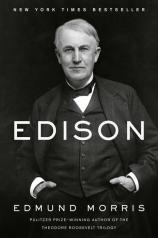Edison
Review
Edison
Though it was in many ways an “unenlightened” era, the late 1800s to early 1900s --- when Jim Crow laws and anti-Semitism were still rife in American culture, and women would not obtain the right to vote until 1920 --- saw the creation of some of the modern world’s most needed systems and machinery, much of them the product of one man’s scientific genius. Pulitzer Prize winner Edmund Morris composed this lively, fact-laden biography of Thomas Alva Edison over the course of seven years.
Edison would eventually hold more than a thousand patents, including sound recording, though his life was marred by deafness that began in his early youth. He was homeschooled and showed entrepreneurial talent as a newsboy, often using his earnings to purchase items he needed for his own chemical experiments. He was, as portrayed by Morris, obsessive, hardworking and well aware of the extent of his mental capacities. He had an early job as a telegrapher, shining with his unusual speed and ability to improve systems, while simultaneously annoying his superiors by neglecting his work and getting sidetracked by his own complex interests. When he opened his own shop, starting a new industry that would become General Motors, he devised his own employment testing system, asking potential workers in his lab “general knowledge” questions that stymied even Albert Einstein.
"EDISON...is definitive. His inventions are described in strict, painstaking detail, and likewise, the events of the great man’s personal life add rich background."
Edison is shown as someone who would not shrink from risk-taking, who was “honest and honorable,” yet willing to do almost anything necessary to beat a competitor to the patent office. He was pals with Henry Ford and Harvey Firestone, contemporaries who shared aspects of the inventor’s genius and commercial aspirations. The three, along with President Harding, went vagabonding in Edison’s latter years, when the Wizard of Menlo Park was famously photographed stretched out on the ground for a nap in a white linen suit.
Morris, who passed away in 2019 after completing this remarkable work, chose to organize the book in a backwards chronology, beginning with Edison’s death and ending with his birth. EDISON, nonetheless, is definitive. His inventions are described in strict, painstaking detail, and likewise, the events of the great man’s personal life add rich background. His sign-offs to letters to his wife, Mina, speak both to his passion and his unrestrained intellect: “With a kiss like the Swish of a 13 inch canon projectile I remain as always your lover sure solid & unchangeable.”
Edison invented not only the light bulb, but also the means of illuminating entire cities, bringing about such an enormous alteration in American life and livelihood that upon his death, President Hoover refused to call for a memorial of a total blackout, which he believed “would immobilize the nation and quite possibly kill countless people.” Private citizens, though, turned their lights out for one minute in a gesture of respect for the man who had made their lives brighter.
Reviewed by Barbara Bamberger Scott on November 1, 2019
Edison
- Publication Date: November 3, 2020
- Genres: Biography, History, Nonfiction
- Paperback: 800 pages
- Publisher: Random House Trade Paperbacks
- ISBN-10: 0812983211
- ISBN-13: 9780812983210



